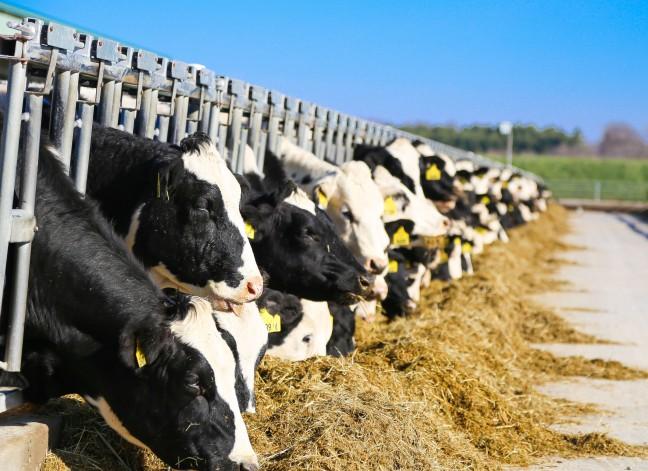UW Oshkosh has partnered with Agra Energy, a California-based renewable fuel production company, to produce carbon-neutral synthetic diesel.
Years of sustainable fuel research allowed UWO to design a digester that converts cow manure into synthetic diesel identical to regular diesel. UWO students are directly involved in the research and production, with the commercial facility set to open in late April 2023 at Dairyland Farm in New Franken, Wisconsin.
According to Agra President Mason Parker, the commercial digester will take raw biomatter, otherwise known as manure, and finish the chemical breakdown begun in the cow’s stomach. After purification and chemical conversion, the final product is diesel fuel.
The facility is called a “digester” because it completes the breakdown of plant materials begun in the cow’s gut, Parker said. In digestion, the plants are broken down on the microscopic level into separate cells and tissues. The facility takes this one step further to break manure down into its separate molecules and elements.
Manure contains carbon dioxide, hydrogen sulfide and methane. The digester cleans out the hydrogen sulfide, and the methane and carbon dioxide are converted to a substance called synthesis gas through a chemical process, Parker said. The resulting product is completely sanitary and easily converted to diesel.
In 2017, Agra requested staff training in operating digester equipment through UWO, Parker said. The training program introduced Agra to the university’s renewable fuel research programs. Conversations led to basic lab testing, and by 2019 Agra had partnered with UWO to build a pilot digester facility, Parker said.
The pilot digester facility was used to test various methods of manure breakdown, Parker said. UWO researchers eventually developed the processing and equipment to convert raw manure into pure synthetic diesel.
Since cows digest the plants much more quickly than the million-year process of fossilization, the diesel Agra produces from manure is renewable and essentially carbon neutral, Parker said. It’s also chemically identical to fossil fuel diesel, so it can be used for all the same vehicles.
The technology is very similar to what is currently used in the petroleum industry. The main difference is that Agra sources biomatter not from ancient decomposed plants or fossil fuels, but from recently-grown plants processed through cows in the form of manure. Both processes convert unrefined matter into hydrocarbons, Parker said.
“Plants and animals have been underground for millions of years,” Parker said. “What we’re dealing with is recently sequestered carbon-all the plants that the cow ate.”
The pilot facility is located at Allen Farms in Allenville, Wisconsin. About 250 cows are involved, UWO’s Director of Biogas Systems and Research Development Brian Langolf said. Since the pilot facility’s diesel production was a success, the commercial facility is designed to scale up production — capable of processing the manure from Dairyland Farms’ 6,000 cows.
In November 2022, construction began on the commercial facility at Dairyland Farm in New Franken, Wisconsin. Work has continued all winter, with expected completion in late April, according to Parker. Since jet fuel is chemically very similar to diesel, the facility will be equipped to produce both.
The partnership allows UWO to research renewable products and Agra, a private company, can market them well, Langolf said. Right now, it’s a matter of testing the market response to renewable synthetic diesel.
The fuel can be used just like regular diesel in cars, trucks and other vehicles with diesel engines. If it’s a commercial success, Agra’s facility will produce both jet fuel and renewable synthetic diesel, Langolf said.
The research benefits UW Oshkosh students, too. Engineering, chemistry and other undergraduate majors can get involved in research, Langolf said. Some work in the labs, and others work directly with researchers or at the pilot facility itself.
Nobel laureate gives talk on moving toward zero carbon emissions
“It could be field work at our pilot facility with our digester and the biogas pilot, it could be doing data analysis,” Langolf said. “There’s various aspects — from the biogas side, to the fuel creation side, to chemistry to data analysis that they [students] can get involved [in].”
Students benefit from the real-world experiences research projects like these provide, Langolf said. Students learn chemical processes in the classroom, but working directly with research faculty or with corporate partners puts undergraduate students ahead in their careers and makes them competitive applicants.
The partnership also allows UWO students hands-on experience with the sustainability industry. The process of converting organic farm waste to synthetic diesel provides students with experience in not only renewable energy production but also waste reduction, Langolf said.
Often, students go on to intern at Agra and obtain post-graduate jobs, Parker said. The company is expanding, and the commercial facility and new hires are part of Agra’s growth. Three of Agra’s recent hires are UWO graduates, Parker said.


